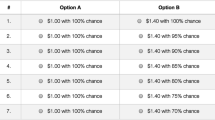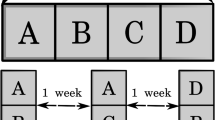Abstract
Much of the evidence raising doubts about expected utility theory (EUT) comes from experiments involving hypothetical decisions. Most of the rest of the evidence comes from experiments where respondents are asked to make a large number of decisions, knowing that only one of these will provide the basis for payment. Concerns have often been expressed about the "realness" of such data, and their reliability as a basis for criticizing EUT and promoting alternative theories. The present article reviews this debate and reports new experimental results that directly address this issue.
Similar content being viewed by others
References
Allais, Maurice. (1953). “Le Comportement de l'Homme Rationnel devant le Risque: Critique des Postulats et Axiomes de l'Ecole Americaine,” Econometrica 21, 503–546.
Battalio, Raymond, John Kagel, and Komain Jiranyakul. (1990). “Testing Between Alternative Models of Choice Under Uncertainty: Some Initial Results,” Journal of Risk and Uncertainty 3, 25–50.
Becker, Gordon, Morris DeGroot, and Jacob Marschak. (1964). “Measuring Utility by a Single-Response Sequential Method,” Behavioral Science 9, 226–232.
Camerer, Colin. (1995). “Individual Decision Making.” In John Kagel and Alvin Roth (eds.), The Handbook of Experimental Economics. Princeton, NJ: Princeton University Press.
Conlisk, John. (1989). “Three Variants on the Allais Example,” American Economic Review 79, 392–407.
Cubitt, Robin, Chris Starmer, and Robert Sugden. (1996). “Dynamic Choice and the Common Ratio Effect: An Experimental Investigation,” mimeo, School of Economics and Social Studies, University of East Anglia.
Davis, Douglas, and Charles Holt. (1993). Experimental Economics. Princeton, NJ: Princeton University Press.
Harrison, Glenn. (1994). “Expected Utility Theory and the Experimentalists,” Empirical Economics 19, 223–253.
Holt, Charles. (1986). “Preference Reversals and the Independence Axiom,” American Economic Review 76, 508–515.
Kagel, John, and Alvin Roth. (1995). The Handbook of Experimental Economics. Princeton, NJ: Princeton University Press.
Kahneman, Daniel, and Amos Tversky. (1979). “Prospect Theory: An Analysis of Decision Under Risk,” Econometrica 47, 263–291.
Karni, Edi, and Zvi Safra. (1987). “Preference Reversal and the Observability of Preferences by Experimental Methods,” Econometrica 55, 675–685.
Rousseas, Stephen, and Albert Hart. (1951). “Experimental Verification of a Composite Indifference Map,” Journal of Political Economy 59, 288–318.
Segal, Uzi. (1988). “Does the Preference Reversal Phenomenon Necessarily Contradict the Independence Axiom?” American Economic Review 78, 233–236.
Shugan, Steven. (1980). “The Cost of Thinking,” Journal of Consumer Research 7, 99–111.
Slonim, Robert, and Alvin Roth. (1995). “Financial Incentives and Learning in Ultimatum and Market Games: An Experiment in the Slovak Republic,” mimeo, Department ofss Economics, University of Pittsburgh.
Smith, Vernon, and James Walker. (1993). “Monetary Rewards and Decision Cost in Experimental Economics,” Economic Inquiry XXXI, 245–261.
Starmer, Chris, and Robert Sugden. (1991). “Does the Random-Lottery Incentive System Elicit True Preferences? An Experimental Investigation,” American Economic Review 81, 971–978.
Wilcox, Nathaniel. (1993). “Lottery Choice: Incentives, Complexity and Decision Time,” Economic Journal 103, 1397–1417.
Author information
Authors and Affiliations
Rights and permissions
About this article
Cite this article
BEATTIE, J., LOOMES, G. The Impact of Incentives Upon Risky Choice Experiments. Journal of Risk and Uncertainty 14, 155–168 (1997). https://doi.org/10.1023/A:1007721327452
Issue Date:
DOI: https://doi.org/10.1023/A:1007721327452




